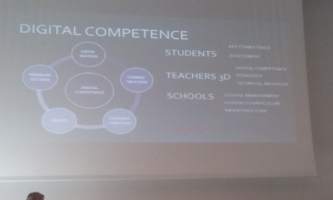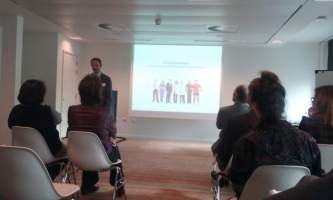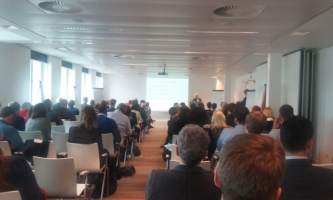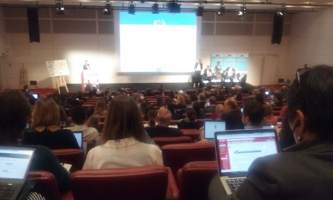 Share this!
Share this!Connecting Education, the Labour Market and Society: Delivering the New Skills Agenda for Europe
Brussels, 20-21 October 2016
The European Education, Training and Youth Forum is an annual event which brings together key stakeholders in education, training and youth.
This year’s Forum was focused on how to best deliver on the New Skills Agenda for Europe adopted by the Commission on 10 June 2016. The New Skills Agenda aims to ensure that people develop a broad set of skills and competences from early on in life in order make the most of Europe’s human capital, as well as to improve employability and competitiveness. Improving skills levels, educational attainment and promoting key competences, including transversal skills, are essential to improving people’s employability, their chances in life as full citizens and creating fair, inclusive and sustainable societies.
The Forum featured discussions and exchanges on upcoming initiatives, in particular the review of the 2006 Recommendation on Key Competences for lifelong learning.
During the Forum, at the interactive Panel, the workshops and the Closing Panel the 10 actions proposed by the European Commission to be taken forward over the next two years has been revised and discussed:
- A Skills Guarantee to help low-skilled adults acquire a minimum level of literacy, numeracy and digital skills and progress towards an upper secondary qualification.
- A review of the European Qualifications Framework for a better understanding of qualifications and to make better use of all available skills in the European labour market.
- The “Digital Skills and Jobs Coalition” bringing together Member States and education, employment and industry stakeholders to develop a large digital talent pool and ensure that individuals and the labour force in Europe are equipped with adequate digital skills.
- The ‘Blueprint for Sectoral Cooperation on Skills’ to improve skills intelligence and address skills shortages in specific economic sectors.
Other actions discussed that will be launched later this year and in 2017 are:
- A “Skills Profile Tool for Third Country Nationals” to support early identification and profiling of skills and qualifications of asylum seekers, refugees and other migrants.
- A revision of the Europass Framework, offering people better and easier-to-use tools to present their skills and get useful real-time information on skills needs and trends which can help with career and learning choices.
- Making Vocational Education and Training (VET) a first choice by enhancing opportunities for VET learners to undertake a work based learning experience and promoting greater visibility of good labour market outcomes of VET.
- A review of the Recommendation on Key Competences to help more people acquire the core set of skills necessary to work and live in the 21st century with a special focus on promoting entrepreneurial and innovation-oriented mind-sets and skills.
- An initiative on graduate tracking to improve information on how graduates progress in the labour market.
- A proposal to further analyse and exchange best practices on effective ways to address brain drain.
In short, one of the big challenges exposed during the Forum by some of the stakeholders is that we are defining now European Skills Agenda and we are planning for the Future, when we don’t actually know what will be the jobs and the future needs of the labour market.
In this sense, one of the main ideas is that the goal of the Agenda is to create innovative and resilient people and give them the competences needed for learning to learn. For this reason, and as Tibor Navracsics said in his presentation, is to focus education and training at the soft skills.
One of the important ideas expressed during the Forum, by the president of the EYF, but also by others stake-holders is that education is not only related to create workers, it is specially related to create citizens and to reinforce the society. For this reason, the civil society needs to be part of the collaboration for defining the Skills Agenda, together with educational and training institutions, Labour market and Governments.
So, education with a holistic approach would be the key for the success as society.
In this sense, the key competences Recommendation is being revised, reinforcing the recognition of formal and non-formal education, focusing on the assessment tools and including transversal skills.
Also, it has been debated the mail role of the Digital skills and competences, for learning for the digital age. In this sense, the conclusion is that ICT should be integrated into the school system, by breaking some materials and non-materials barriers: increasing the devices available, training the teachers and using the knowledge of the students about ICT. For achieving this challenge, it is necessary to include other key actors alongside the Government, as ICT enterprises, families, teachers, community, young people, etc.
Another concern of the participants was how to include young people as one of the main players of the New Agenda, because we were talking during two days about young people and their educational needs and skills, but they were not taking part at this Forum.
In this sense, another concern was how inclusiveness could be more reflected at the News Skills Agenda and how could include actions regarding groups with special needs (as disabilities, refugees, Roma people, other groups, etc.).
Another of the debates where related to Tracking Graduates, one of the ten action proposed by the EC. There are tracking graduates studies all over the EU countries. But the data aren’t comparable in a lot of cases, and the harmonisation of the national studies only is possible by sacrificing much richness of detail.
In this sense, the European Commission has the proposal of developing a EU-level tracking, that could be the only feasible tool for providing strong comparability across countries. Some of the participants expressed their doubts for the effort for collecting these data and the usefulness of them. One of the keys for the success of this action is to coordinate this pilot project with the national data collection initiatives and the collaboration between the national tracking organisations.
At least, another of the topics that has been presented and analysed were the main EU tools and services for comparability and understanding of skills and qualifications. The aim was to identify the way to improve them and to simplify all the instruments:
- PLOTEUS: Learning Opportunities and Qualifications in Europe. Information about courses, work-based learning and qualifications
- The EURES platform helps jobseekers to move abroad by finding a job in Europe. It is a cooperation network designed to facilitate the free movement of workers within the EU 28 countries plus Switzerland, Iceland, Liechtenstein and Norway. The network is composed of: the European Coordination Office (ECO), the National Coordination Offices (NCOs), EURES Partners and the Associated EURES Partners.
- SKILLS PANOMARA. The Skills Panorama integrates in one single portal data and information on skills needs and mismatches from several different European and International sources. Skills Panorama is brought to you by the European Commission, Directorate-General for Employment, Social Affairs and Inclusion and powered by Cedefop, the European Centre for the Development of Vocational Training.
- EUROPEAN YOUTH PORTAL . Information and opportunities for young people across Europe
- EUROGUIDANCE NETWORK. Linking Lifelong Guidance and International Mobility across Europe
- ENIC: European Network of Information Centres in the European Region and NARIC: National Academic Recognition Information Centres in the European Union, a joint initiative of the European Commission, the Council of Europe and UNESCO
The flash report of the event is also now available.




Author: Àngels Piédrola i Gómez, Coordinadora PNJCat, Agència Catalana de la Joventut
